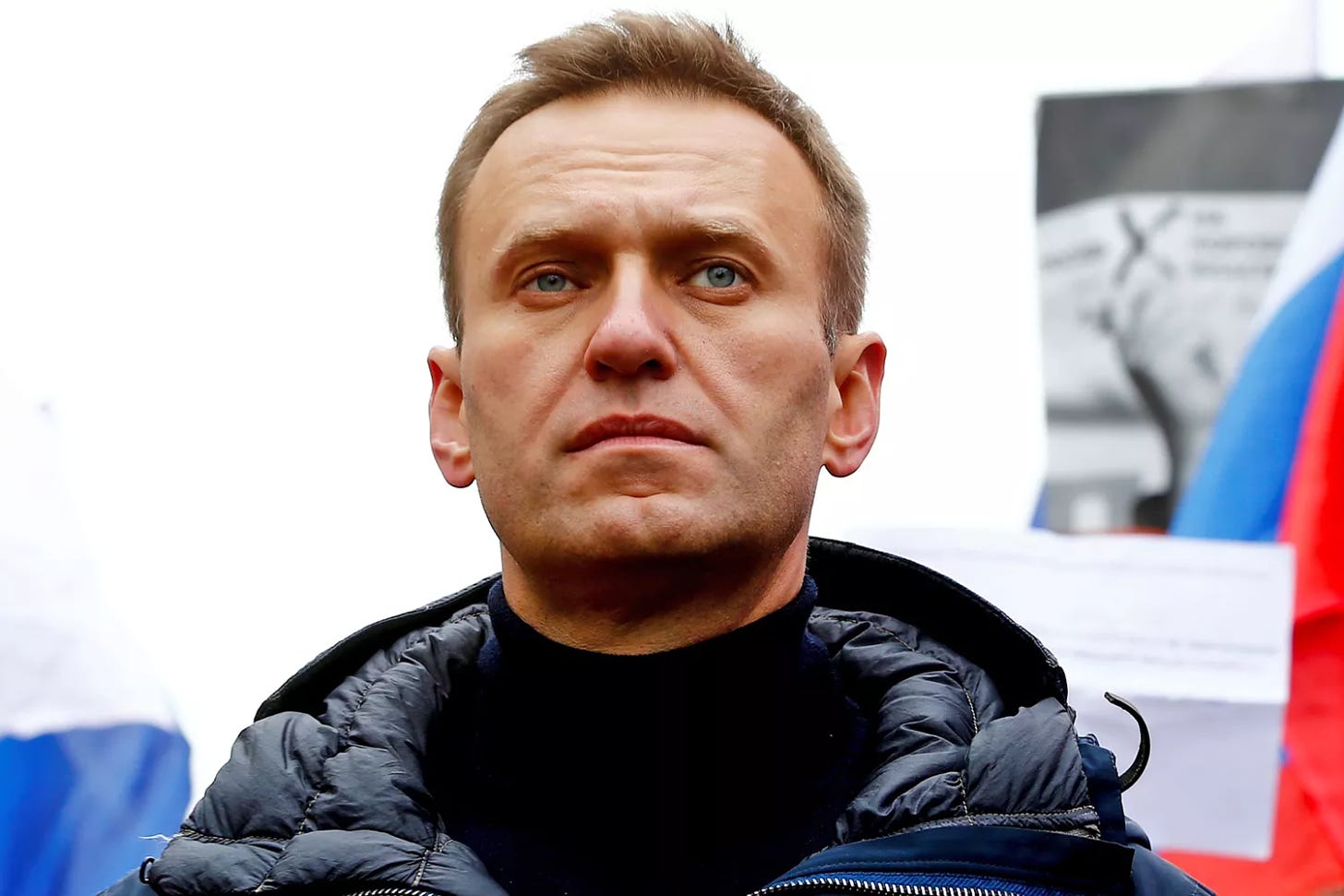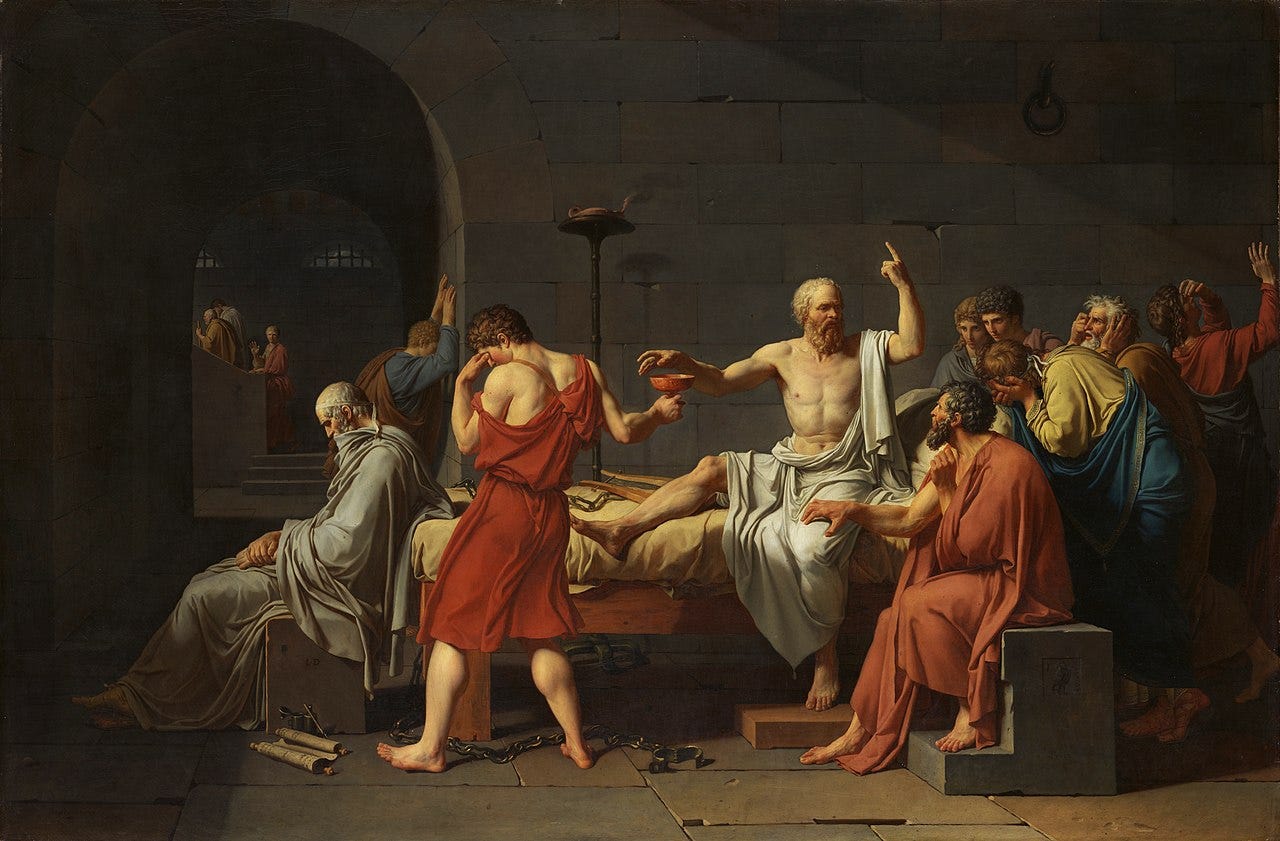What Navalny Learned from Socrates
The death of Alexei Navalny came as a shock to those of us who long for - and fight for - a post-Putin Russia. As I say my prayers for the hero Russians need and Putin fears, I am reminded of Socrates. Although the great thinker lived and died 2,500 years before Navalny, his example of moral courage in the Platonic dialogue Crito was certainly taken to heart during the Russian dissident’s last days in the Arctic penal colony.
Navalny, of course, shares a great deal in common with Socrates. Both spoke out against their native polities, both were condemned to death by their home states, and both states had been embroiled in long and bitter foreign conflicts - Socrates’ Athens suffered defeat by Sparta, and Navalny’s Russia is fighting a protracted war in Ukraine. Moreover, both men showed their moral fortitude by committing to their sentences, despite the prospects of certain death. In the Crito, the setting was Socrates’ prison cell, where the titular interlocutor comes to visit. As shown in the Apology, the demos of Athens had condemned Socrates to death for the charge of ‘corrupting’ the city-state’s youths. But to the surprise of Crito, Socrates is facing the inevitability of execution with stunning equanimity:
Crito: Why, indeed, Socrates, I myself would rather not have all this sleeplessness and sorrow. But I have been wondering at your peaceful slumbers, and that was the reason why I did not awaken you, because I wanted you to be out of pain. I have always thought you happy in the calmness of your temperament; but never did I see the like of the easy, cheerful way in which you bear this calamity.
Socrates: Why, Crito, when a man has reached my age he ought not to be repining at the prospect of death.
While we are still unclear how Navalny endured his last days of mortality, we can be certain that he has reconciled with the prospect of death under the current Russian regime. For on January 17th, 2021, Navalny returned to his home country from Germany, having survived a poisoning attempt the year before. Incidentally, Socrates was also a victim of poisoning twenty-four centuries prior (in 399 BC), but for his case, the dose was fatal. The attempt on Navalny’s life, similar to the successful ones launched against fellow dissidents Boris Nemtsov and Anna Politkovskaya, reeks of cowardice and subterfuge. But by boarding the plane back to Moscow, he chose to accept his martyrdom.
Back in the Athenian prison, four centuries before the birth of Christ, Crito urges his condemned friend to escape, but Socrates steadfastly refuses:
Crito: O! my beloved Socrates, let me entreat you once more to take my advice and escape. For if you die I shall not only lose a friend who can never be replaced, but there is another evil: people who do not know you and me will believe that I might have saved you if I had been willing to give money, but that I did not care. Now, can there be a worse disgrace than this- that I should be thought to value money more than the life of a friend? For the many will not be persuaded that I wanted you to escape, and that you refused.
Socrates: But why, my dear Crito, should we care about the opinion of the many? Good men, and they are the only persons who are worth considering, will think of these things truly as they happened.
If you were with Alexei Navalny when he decided to board the plane from Germany, would you have played the role of Crito and urge him not to fly home? I certainly would. Navalny suffered evil when he was poisoned, and he was fully within his rights to stay out of Russia for good. But doing so, he believes, would be to retaliate evil with evil. Natan Sharansky, the great Soviet dissident and Jewish refusenik whose memoir provided Navalny with much-needed inspiration and comfort, writes to his friend and comrade:
I was very angered by the question of a certain European correspondent the day after your return to Russia. “Why did he return? We all knew that he would be arrested in the airport—does he not understand such simple things?” My answer was pretty rude: “You’re the one who doesn’t understand something. If you think that his goal is survival—then you are right. But his true concern is the fate of his people—and he is telling them: ‘I am not afraid and you should not be afraid either.’ ”
By submitting himself to the Russian State’s torturous punishment, Navalny gained moral and spiritual freedom, knowing that what he did was virtuous. Socrates would have been proud:
Think not of life and children first, and of justice afterwards, but of justice first, that you may be justified before the princes of the world below. For neither will you nor any that belong to you be happier or holier or juster in this life, or happier in another… Now you depart in innocence, a sufferer and not a doer of evil; a victim, not of the laws, but of men.
Despite the evil permeating his death (or should I say assassination?), we have not seen the last of Alexei Navalny. His name shall be associated with all that is good about the Russian people, and all that is rotten and wicked about the current Russian regime. In his life, he exemplified moral courage under fierce opposition, and in his death, he exemplified unwavering conviction in the fight for Free Russia. While Vladimir Putin believes himself to be a strongman (and some American commentators seem enchanted by this image), he constantly confuses brutality for strength - both in his gangster-style execution of political enemies to his subjugation of neighboring states. That is far from genuine strength, and it is the weakness which may lead to his eventual undoing, if God wills.
Requiescat In Pace, Alexei Anatolyevich Navalny (1976 - 2024). We pray for your eternal soul, and the anguished soul of Mother Russia.





